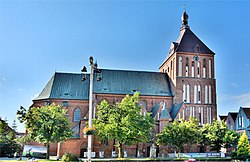Diocese of Kołobrzeg
|
Diocese of Koszalin-Kołobrzeg Dioecesis Coslinensis-Colubreganus Diecezja Koszalińsko-Kołobrzeska |
|
|---|---|

Cathedral of the Immaculate Conception in Koszalin
|
|
| Location | |
| Country | Poland |
| Ecclesiastical province | Archdiocese of Szczecin-Kamień |
| Metropolitan | Szczecin-Kamień |
| Statistics | |
| Area | 14,640 km2 (5,650 sq mi) |
| Population - Total - Catholics |
(as of 2013) 913,000 833,000 (91.3%) |
| Information | |
| Rite | Latin Rite |
| Established | 28 June 1972 |
| Cathedral | Katedra pw. Niepokalanego Poczęcia Najświętszej Maryi Panny in Koszalin |
| Co-cathedral | Bazylika Konkatedralna Wniebowzięcia Najświętszej Maryi Panny in Kołobrzegu |
| Current leadership | |
| Pope | Francis |
| Bishop | Edward Dajczak |
| Metropolitan Archbishop | Andrzej Dzięga |
| Auxiliary Bishops | Krzysztof Zadarko Krzysztof Stefan Włodarczyk |
| Emeritus Bishops | Tadeusz Werno (Auxiliary Bishop Emeritus), Paweł Cieślik (Auxiliary Bishop Emeritus) |
| Website | |
| Website of the Diocese | |
The Roman Catholic Diocese of Koszalin-Kołobrzeg (Latin: Coslinen(sis) – Colubregan(us)) is a Latin rite suffragan diocese in the Ecclesiastical province of the Metropolitan Archdiocese of Szczecin-Kamień in northwestern Poland.
It has its cathedral episcopal see is the Katedra Niepokalanego Poczęcia NMP, in Koszalin, as well as a Co-Cathedral, which is the Minor Basilica: Bazylika Konkatedralna Wniebowzięcia NMP, in Kołobrzeg, both in Zachodniopomorskie, and a former Cathedral: Katedra Świętej Rodziny Katedra Świętej Rodziny, in Piła, in Wielkopolskie.
As per 2014, it pastorally served 822,058 Catholics (90.0% of 912,929 total) on 14,640 km² in 220 parishes with 574 priests (439 diocesan, 135 religious), 367 lay religious (142 brothers, 225 sisters) and 53 seminarians.
According to the Polish Institute of the Catholic Church Statistics, weekly mass attendance was 25% in 2013 making the diocese the second least devoutly religious one in Poland after the Archdiocese of Szczecin-Kamień.
In 1000 a Diocese of Kolberg (German name) was established at present Kołobrzeg (present Polish), one of several German cities in Pomerania.
In 1015 it was however suppressed, its territory being reassigned partly to the Metropolitan Archdiocese of Gniezno (from 1145 however signed over to the exempt Diocese of Kammin, and partly to establish the Diocese of Kujawy–Pomorze (which would merge into aforementioned Gnesen).
...
Wikipedia
